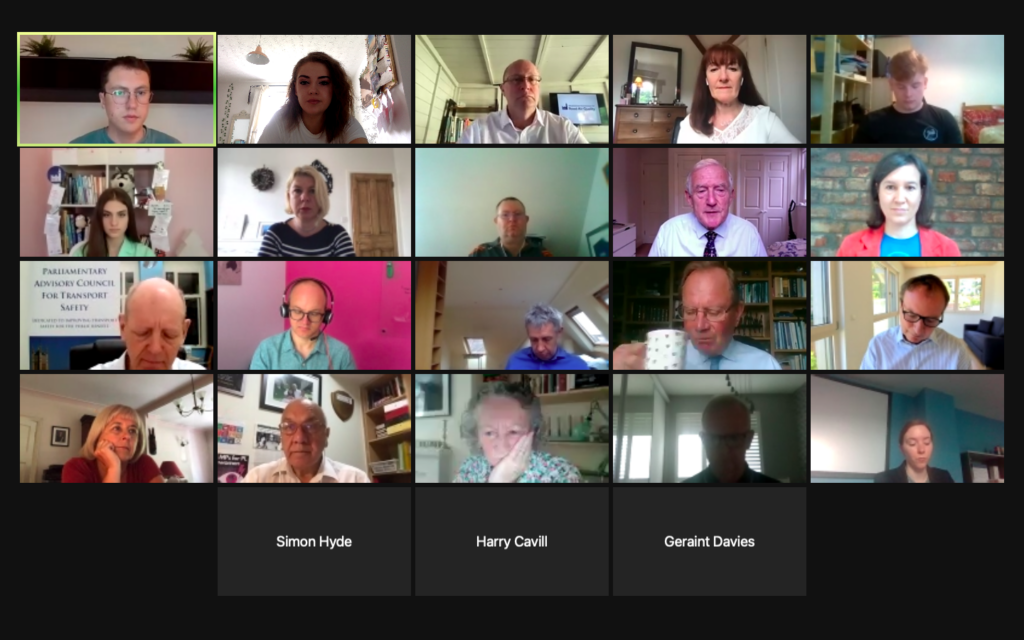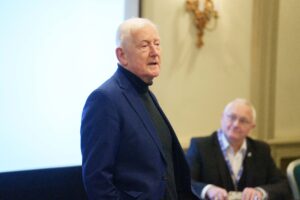Chair of WCRAQ, Barry Sheerman MP, hosted the Clean Air Day – Call to Arms meeting to take action on air pollution and protect children’s health. Global Action Plan joined him, EV Thank You, PACTS and the Clean Air Champions Professor Sir Stephen Holgate and Professor Jonathan Grigg.
WCRAQ Chair Barry Sheerman MP led the Clean Air Day Call to Arms on June 17. WCRAQ organised this event focussing on MPs so they could learn what policy changes need to be implemented to tackle the major health crisis of air pollution.
Each year, 40,000 people in the UK die prematurely because of the poor quality of air they breathe. Yet, healthcare professionals are not trained enough or taught to recognise the effect of air pollution on the human body. Action is required to educate healthcare professionals about the effect of air pollution on the human body and to get sustainability on the curriculum.
Larissa Lockwood, Clean Air Director of Global Action Plan, emphasised the importance of bringing the public’s attention to the ‘invisible killer’ of air pollution. Clean Air Day has helped raise awareness of the health impact of breathing dirty air. A recent poll showed that the public believes air pollution should be prioritised above smoking, healthy eating, and potholes.
The meeting then heard from the newly appointed WCRAQ Youth Ambassador, Charlotte Smith of the EV Thank You campaign. The Commission is delighted to have Charlotte on board as a voice for the young generation which will ultimately bear the consequences of internal combustion engines. The EV Thank You campaign has led to thousands of EV drivers being thanked across the UK, Oslo, and California. Charlotte aims to visit every country in an electric car to thank all-electric drivers committed to protecting children from the harmful effects of emissions.
Clean Air Champions, WCRAQ Air Health Chair Professor Sir Stephen Holgate, Clinical Professor of Immunopharmacology at the University of Southampton, and Professor Jonathan Grigg, Queen Mary University, London, addressed the MPs.
Professor Sir Stephen Holgate highlighted three key learnings from the inquest for Ella Kissi-Debrah and Coroner Philip Barlow’s subsequent ‘Prevention of Future Deaths’ report.
Firstly, the UK Government must realign the legal limits of air pollution levels to the World Health Organisation’s recommended safe limits. The WHO guideline stipulates that PM2. 5 not exceed 10 μg/m3 annual mean
Secondly, air pollution levels in local areas must be communicated to the public. The language around improving air pollution should shift the focus from the negatives impacts to the positive. For example, we should stop complaining about limiting car journeys and tolls for driving in city centres and highlighting the positives of walking and cycling to protect our children’s health and the most vulnerable in society.
Thirdly, Holgate emphasised the need for the medical community to be trained and made aware of air pollution’s health impacts. He reflected that in her 30 admissions to the hospital, Ella Kissi-Debrah was not once considered to have been exposed to high levels of air pollution. This is not the fault of her doctors and nurses but a reflection of their curriculum.
Lastly, David Davies of the Parliamentary Advisory Council for Transport Safety and Jason Airey, MD of CMS SupaTrak and Energy, Fuels & Vehicles Chair, discussed the release of the new constituency dashboard. The dashboard will offer a fair representation of air quality over each constituency for MPs and the general public to utilise. Moreover, it will show the distribution of electric cars and electric charging points, crucial for the rollout of EVs as we reach 2030.
In the Q&A session, MPs discussed their pressing air quality questions and suggestions, including air quality being added at the end of weather forecasts along with the pollen count. MPs who were attendees included: Chrstine Jardine, Liberal Democrat MP for Edinburgh West and Liberal Democrat Treasury Spokesperson; Virendra Sharma, Labour MP for Ealing; Jenny Jones, Baroness Moulsecomb and former Deputy London Mayor; Richard Best, Baron Best of Godmanstone; Ruth Jones, MP for Newport West and Labour’s Shadow Minister for Natural Environment and Air Quality; Baron Whitty, Lord Whitty of Camberwell; Geraint Davies, Chair of APPG on Air Pollution and MP for Swansea West; as well as Representatives from the offices of Nickie Aiken MP, City of Westminster, Peter Dowd MP, Bootle, and Jo Gideon MP, Stoke on Trent Central.
Ruth Jones MP asked if it is true that particulate matter does not need to be monitored as nitrogen dioxide is an indicator of ultrafine particle levels.
‘Non-tailpipe emissions are a real issue that we will face with electric vehicles,’ Jason Airey explained that while they will not directly emit nitrogen dioxide through the tailpipe, microplastics will still be released through the tyres and brakes.
Baron Best commented that 76 per cent voted against a congestion charge in Edinburgh, and asked how we mind change the minds of the car-driving electorate, and whether political leadership can do more to drive progress?
To this, Barry Sheerman MP, Chair of WCRAQ, responded that politicians listen when electorates get angry an issue. He went on to highlight the work of Oxford City council who have put air monitors on every refuse collection vehicle to get pollution information for every street. Having information that a street is polluted may soon affect house value and desirability.
Moreover, Nickie Aiken MP will also give a special mention of Dr James Tate’s work with our Commission in her Topical Question for the Department for Transport on Thursday 1 July.
However, the issue of air pollution will not go away after Clean Air Day. So, what are you doing to defend our inalienable right to breathe clean air? Become a WCRAQ member today by emailing jason.pidgeon@visiecommunications.co.uk.





One thought on “WCRAQ hosts Clean Air Day – Call to Arms for MPs to take action against air pollution”
Comments are closed.